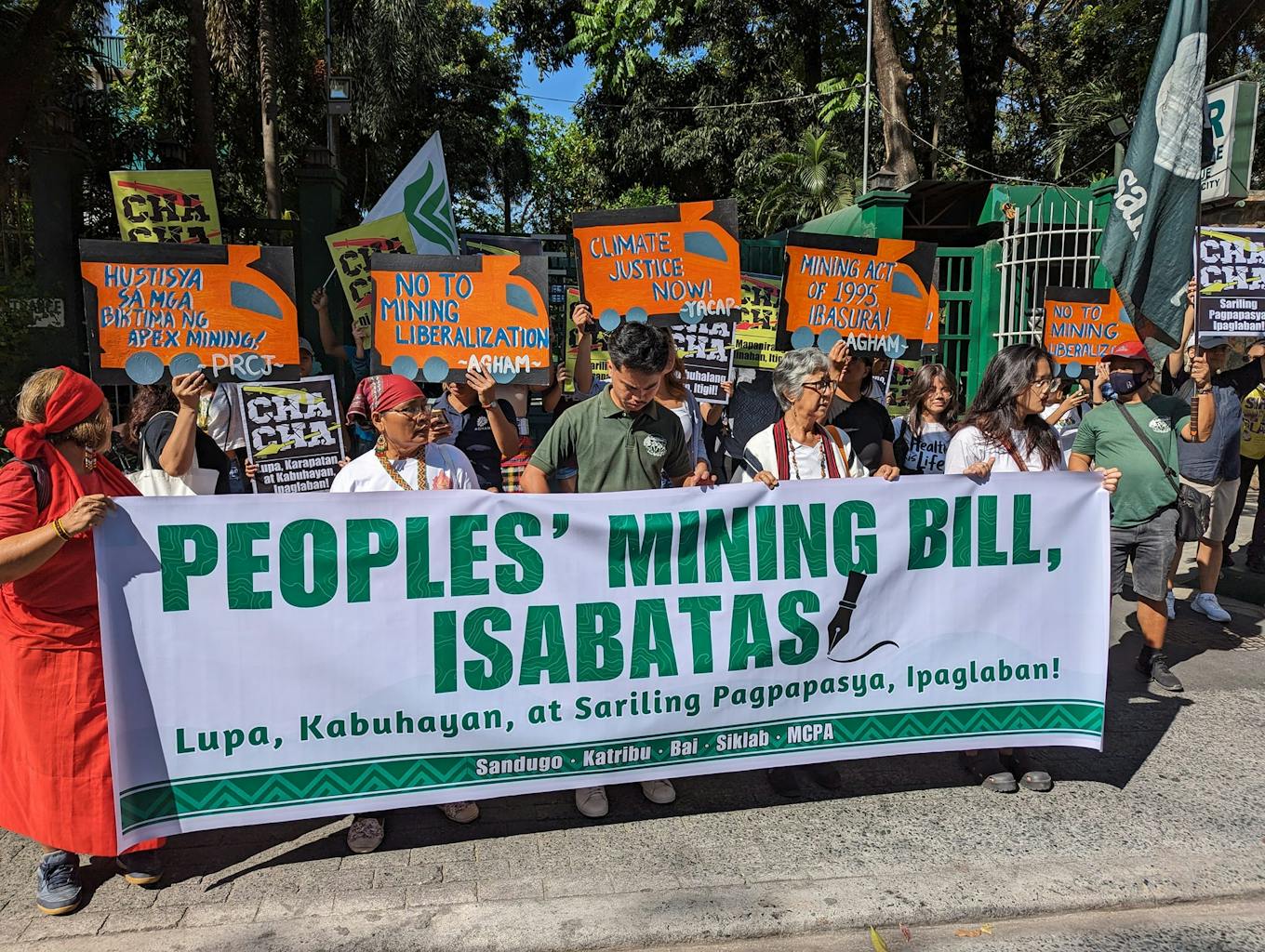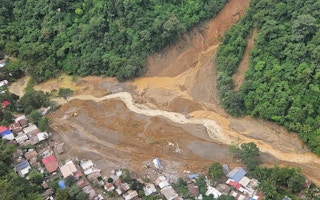Filipino environmental groups renewed calls to revoke the country’s decades-old mining law and demanded a halt to mining operations in the Mindanao island group in the aftermath of a massive landslide on 6 February.
To continue reading, subscribe to Eco‑Business.
There's something for everyone. We offer a range of subscription plans.
- Access our stories and receive our Insights Weekly newsletter with the free EB Member plan.
- Unlock unlimited access to our content and archive with EB Circle.
- Publish your content with EB Premium.
The death toll that hit the gold-mining community of Masara in the town of Maco, Davao de Oro rose to 93, 12 days after the catastrophe, with at least 32 injured, and several more missing.
Kalikasan People’s Network for the Environment (PNE), along with other environmental, human rights, indigenous, and faith-based groups held a protest on 4 March in front of the Department of Environment and Natural Resources in commemoration of the 29th anniversary of the Philippine Mining Act of 1995.
The law was designed to revive the mining industry and attract more foreign investment by defining the agreements for mineral exploitation, and provide the requirements for acquiring mining rights.
PNE said the regulation “has done little for the country but wreaked havoc on our ecosystems and communities.”

Environmentalists hold a protest action on 4 March in front of the department of environment and natural resources in commemoration of the 29th anniversary of the Philippine Mining Act of 1995. Image: Kalikasan PNE
Jon Bonifacio, national coordinator of the group, urged the passage of the People’s Mining Bill that will regulate the industry and “ensure accountability can be sought and achieved in the case of mining-related disasters.
The bill aims to ensure that mining operators will support communities and boost national industries, instead of destroying the environment and communities. It was approved by congress last year and is pending a final decision by the senate.
Protesters earlier demanded an investigation and called on the government to halt the mining operations of Apex Mining Corporation in Maco, to determine the extent of their accountability in the incident.
“The Masara landslide showed how the worsening impact of climate change has been intersecting with corporate negligence and impunity in the country,” said Bonifacio.
Insufficient data to determine cause of landslide
One month on from the tragedy, geologists who have been studying the case say there is not enough data to show that it was caused by mining.
While the landslide is within Apex Mining’s mineral production sharing agreement (MPSA), which gives the company exclusive rights to mine within a contract area, it is more than 600 meters away from the mine tailings dam and far away from the active mining sites where actual extraction is occurring, Richard L. Ybañez, chief science research specialist, education division, University of the Philippines Resilience Institute, told Eco-Business.
“Satellite images show that the source of the landslide was previously thickly vegetated or forested areas. This rules out deforestation and human activity on the surface as possible triggers for the landslide,” said Ybañez, one of the geologists who assessed the cause of the landslide. Ybañez’s team is basing its findings on satellite imagery and drone data made available on social media.
“The landslide material was composed of volcanic deposits which have no economic value. That area, as far as the volcanic deposits are present, would be of no interest to miners,” he said. “Our conclusion at the moment based on the data available is that the landslide was caused by heavy rainfall.”

A brown streak along the stream where the landslide occurred indicates a highly eroded area. There are thick trees around the landslide, that geologists say debunk any claims of deforestation. Image: University of the Philippines Resilience Institute, Google Earth
Mindanao received 50 per cent more rainfall between 1 December 2023 to 16 February 2024 than the island group has historically in pre-industrial times, according to analysis released in 1 March by the World Weather Attribution group, an academic collaboration of international climate scientists studying extreme meteorological events, including storms and landslides.
While increasing rainfall is expected because a warmer atmosphere can hold more moisture, there is limited data to show that human-caused climate change is responsible for this increase, said the study.
In January, Mindanao experienced back-to-back intense precipitation events over the course of a week. The downpours led to floods and the devastating landslides in Masara.
Nevertheless, the report noted that the area has had a history of landslides like the one in 2008, which left 24 dead.
Since then, the Mines and Geosciences Bureau identified it to be a critical area and a no-build zone. But despite the warning, development like mining has continued.
“More stringent assessments of landslides and enforcement of warnings are needed to avoid similar disasters in the future. The risk of landslides has also been increased by deforestation caused by farming, logging, and mining operations across eastern Mindanao Island,” the report said.
Want more Philippines ESG and sustainability news and views? Subscribe to our Eco-Business Philippines newsletter here.

















